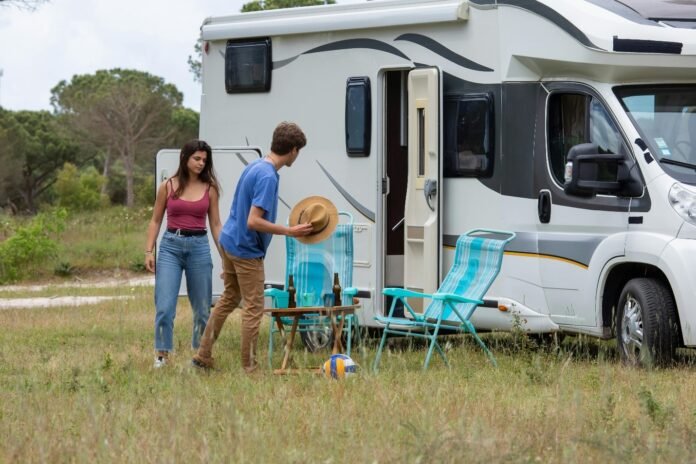Last Updated on January 11, 2026 by Rida Gul
Owning a trailer or RV gives homeowners the freedom to travel and explore at their convenience. However, when not in use, these vehicles need proper storage to prevent damage and keep them secure. Storing a trailer or RV at home may not always be practical, especially if space is limited or local regulations restrict large vehicles in residential areas.
Finding the right storage solution depends on several factors, including available space, budget, and how often the vehicle is used. Some homeowners choose to store their trailers in their driveway or backyard, while others look for off-site storage facilities that provide added security and protection from the elements. For those living in areas with varying weather conditions, such as Boise, Idaho, securing a proper storage solution can be even more important.
Weather conditions, security concerns, and maintenance are all factors homeowners must consider when deciding where to store their trailers and RVs. In areas with fluctuating temperatures, exposure to extreme heat, snow, or moisture can cause wear and tear over time. Additionally, leaving a vehicle unattended for long periods increases the risk of theft or vandalism.
Table of Contents
Choosing the Right Parking or Storage Option
The first step in storing a trailer or RV is selecting a suitable location. If homeowners have enough space at home, they may choose to park their vehicle in a driveway, garage, or designated area on their property. However, this is not always an option, especially in neighborhoods with strict HOA rules or limited yard space.
Many homeowners turn to off-site storage facilities to keep their vehicles safe and free up space at home. In regions where seasonal weather affects vehicle storage, climate-controlled or covered storage options provide additional protection. If you’re an RV or trailer owner in search of car storage Boise Idaho offers a wide range of facilities where your vehicles will be shielded from snow, heavy rain, and extreme heat. Secure storage facilities offer a convenient solution for those who travel seasonally and need a safe place to store their vehicles for extended periods.
Off-site storage facilities also help prevent driveway congestion and keep properties looking neat. With options ranging from outdoor parking spaces to fully enclosed storage units, homeowners can choose the level of protection that best fits their needs.
Outdoor vs. Indoor Storage: Pros and Cons
When deciding between outdoor and indoor storage, homeowners should weigh the benefits and drawbacks of each option. The best choice depends on factors like budget, climate, and how frequently the trailer or RV will be used.
- Outdoor storage is the more affordable option and provides easy access for those who use their vehicles frequently. However, it offers less protection from weather and security risks. Parking an RV or trailer outdoors requires additional precautions, such as using weather-resistant covers and installing security locks.
- Indoor storage provides maximum protection from weather conditions and potential theft. Fully enclosed storage units keep vehicles in controlled environments, preventing damage from sun exposure, snow, or rain. While more expensive, indoor storage is ideal for long-term vehicle preservation.
Some homeowners choose a combination of both, using outdoor storage for short-term parking and indoor storage during extreme weather months. Understanding local climate patterns and storage facility options can help make the best decision.
Security Measures for Storing Trailers and RVs
Securing a trailer or RV is just as important as choosing the right storage location. These vehicles are valuable and can be a target for theft if not properly protected.
For at-home storage, homeowners can take the following security precautions:
- Install motion-activated security lights to deter trespassers.
- Use heavy-duty wheel locks and hitch locks to prevent unauthorized movement.
- Set up surveillance cameras to monitor the area where the vehicle is stored.
For off-site storage, choosing a facility with strong security measures is essential. Gated access, 24-hour surveillance, and on-site management help keep vehicles safe from vandalism and break-ins. Some storage facilities also offer keypad entry systems, ensuring only authorized users can access their vehicles.
Another security measure is using GPS tracking devices, which allow owners to monitor their trailers or RVs remotely. If a vehicle is ever stolen, a GPS tracker increases the chances of recovery.
Maintenance Tips for Long-Term Storage
Even when stored properly, trailers and RVs need regular maintenance to stay in good condition. Vehicles that sit idle for long periods can develop mechanical issues, battery drainage, or tire damage. Before placing a vehicle in storage, homeowners should follow these key steps:
- Clean the interior and exterior to remove dirt, food, and moisture that could lead to mold or pest problems.
- Check tire pressure and inflate tires to the recommended PSI to prevent flat spots.
- Disconnect or maintain the battery by either removing it or using a trickle charger to keep it from losing power.
- Seal windows and vents to prevent dust, insects, and moisture from getting inside.
- Cover the vehicle with a breathable, waterproof cover to protect it from dirt and UV damage.
For RVs with water tanks, it’s essential to drain the tanks and winterize plumbing if storing the vehicle during colder months. It prevents freezing and potential pipe damage.
Performing regular check-ups, even while the vehicle is in storage, ensures that it remains in good shape and is ready to use when needed.
Choosing Between Short-Term and Long-Term Storage
Another factor to consider is whether the vehicle will be stored for a short period or an extended time. Short-term storage is often used for seasonal travel when the vehicle is only parked for a few months. Long-term storage, on the other hand, requires additional precautions, such as fuel stabilizers to prevent engine issues and periodic inspections to prevent deterioration.
Homeowners who travel frequently may benefit from flexible storage plans that allow easy access to their vehicles. Some storage facilities offer month-to-month rental options, while others provide long-term contracts for added cost savings.
Proper storage is essential for protecting trailers and RVs from damage and security risks. Homeowners should carefully consider whether to store their vehicles at home or in a designated storage facility based on space, climate, and security needs.
Outdoor storage is a budget-friendly option but requires additional security measures, while indoor storage provides maximum protection against weather conditions. Investing in a secure storage facility, using protective covers, and performing regular maintenance can help preserve the vehicle’s condition and extend its lifespan.
Take the right precautions, and you can ensure your trailers and RVs remain safe, secure, and ready for their next adventure. With the right approach, vehicle storage can be hassle-free and cost-effective, providing peace of mind for years to come.
Apart from that, if you are interested to know about “Daycare vs” then visit our “Lifestyle” category.



























